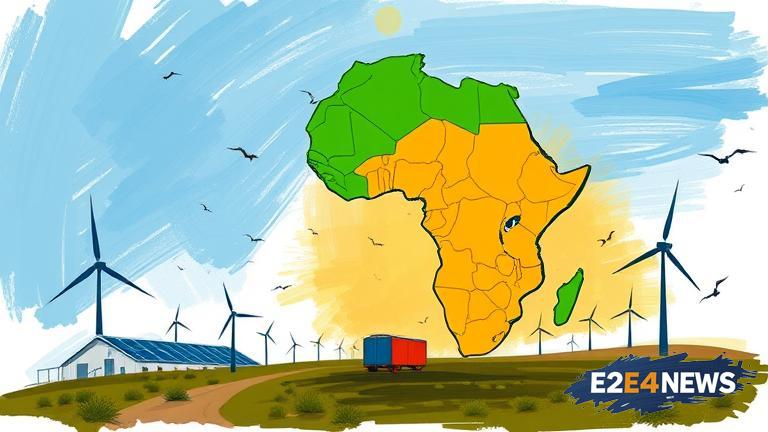The African continent is witnessing a significant shift towards renewable energy, driven by the need to address the pressing issues of energy access, energy security, and climate change. With many countries still struggling to provide reliable and affordable electricity to their citizens, renewable energy has emerged as a viable solution. Solar and wind power are leading the charge, with countries like South Africa, Egypt, and Morocco investing heavily in these sectors. The cost of renewable energy technologies has decreased dramatically over the years, making them more competitive with fossil fuels. This has led to a surge in investment, with international organizations and private companies pouring billions of dollars into African renewable energy projects. The African Development Bank has been at the forefront of this effort, providing financing and technical assistance to countries seeking to develop their renewable energy sectors. The bank’s goal is to increase the share of renewable energy in Africa’s energy mix to 30% by 2030. To achieve this, it is working with governments, private sector companies, and civil society organizations to create an enabling environment for renewable energy development. This includes the development of policies and regulations, the provision of financing and technical assistance, and the promotion of public-private partnerships. In South Africa, for example, the government has set a target of generating 42% of its electricity from renewable sources by 2030. The country has already made significant progress in this regard, with renewable energy accounting for over 10% of its electricity generation. Egypt is another country that is making significant strides in the renewable energy sector. The government has set a target of generating 20% of its electricity from renewable sources by 2022, and is investing heavily in solar and wind power projects. Morocco is also a leader in the renewable energy sector, with a goal of generating 52% of its electricity from renewable sources by 2030. The country has already made significant progress, with renewable energy accounting for over 30% of its electricity generation. Other countries, such as Kenya, Tanzania, and Ghana, are also making significant investments in renewable energy. Kenya, for example, has set a target of generating 70% of its electricity from renewable sources by 2030, while Tanzania is investing heavily in solar and wind power projects. Ghana is also making significant progress, with renewable energy accounting for over 10% of its electricity generation. The growth of the renewable energy sector in Africa is not without its challenges, however. One of the major challenges is the lack of infrastructure, including transmission and distribution lines. Another challenge is the high upfront costs of renewable energy technologies, which can make them prohibitively expensive for many countries. Despite these challenges, the future of renewable energy in Africa looks bright. With the cost of renewable energy technologies continuing to decrease, and with international organizations and private companies investing heavily in the sector, it is likely that renewable energy will play an increasingly important role in Africa’s energy mix. In fact, the International Energy Agency (IEA) has predicted that Africa will be one of the fastest-growing regions for renewable energy in the coming years. The IEA has also predicted that renewable energy will account for over 50% of Africa’s electricity generation by 2050. This is a significant increase from the current level of around 20%, and highlights the enormous potential for renewable energy growth in Africa. As the continent continues to grow and develop, it is likely that renewable energy will play an increasingly important role in meeting its energy needs. With its abundant natural resources, including solar and wind power, Africa has the potential to become a leader in the global renewable energy sector. The development of the renewable energy sector in Africa will also have significant benefits for the environment, including reducing greenhouse gas emissions and mitigating climate change. It will also have significant benefits for local communities, including creating jobs and stimulating economic growth. In conclusion, the growth of the renewable energy sector in Africa is a significant development that has the potential to transform the continent’s energy landscape. With its abundant natural resources, and with international organizations and private companies investing heavily in the sector, it is likely that renewable energy will play an increasingly important role in Africa’s energy mix.
